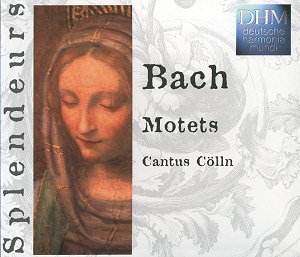Bach’s motets differ
from his cantatas in that, apart from
being, on the whole, much shorter, they
contain no vocal solo numbers nor instrumental
obbligati. Indeed, there is no specified
instrumentation, and they used to be
performed a cappella (i.e. without
accompaniment). However, most conductors
today follow the practice we find on
this disc of supporting the voices with
continuo and discreet instrumental doubling.
Cantus Cölln consists,
as here represented, of eight singers
plus an instrumental group consisting
of oboes, taille (tenor oboe), bassoon
and strings, with organ and lute continuo,
the latter supplied by the artistic
director Konrad Junghänel. For
me, this creates an ideal sound-world:
intimate and flexible, yet not without
the possibility of richness when needed.
The singing would have
to be described as ‘virtuoso’; having
sung these works myself (in a chamber
choir not one-on-a-part, I hasten to
add!), I know how very difficult and
treacherous they are. They require flawless
intonation throughout passages of sometimes
extreme chromaticism, and the ready
availability of many different styles
of articulation. All of this, Cantus
Cölln possess and deliver in great
style. The voices are in many cases
very fine, notably Johanna Koslowsky,
whose soaring lines in Komm, Jesu, Komm
are supremely lovely, and Gerd Türk,
whose tenor is clear and focused without
being reedy. These are young voices,
athletic and flexible.
Nevertheless, I found
these performances variable in their
impact. Singet dem Herr ein neues
Lied ("Sing to the Lord a new
song"), such a joyous piece, feels
somehow matter-of-fact, almost bland.
Everything is in place, but the music
seems like clock-work rather than a
living, growing organism. The darker
pieces fare better; Fürchte
dich nicht (given here as "Fear
thou not") has one of Bach’s
finest chromatic fugues, and the singers
sculpt the complex lines with great
control and cumulative intensity.
Those same qualities
inform the greatest of the motets, Jesu
meine Freude ("Jesus my joy").
In its way, this is one of Bach’s supreme
achievements, in that it amalgamates
so many different structural ideas –
principally fugue and variations – into
one unique whole. Into its eighteen
minute duration, is packed a great range
of emotions, with dramatic word-painting
and breathtaking contrapuntal mastery.
Konrad Junghänel controls the tempi
with subtlety and sensitivity, revealing
the many expressive shades while preserving
the overall unity.
A fine issue, then,
though Harmonia Mundi might need to
recommend new glasses for some of their
staff – the slip-case gives the title
of the first motet as Singet dern
(sic) Herr ein nettes Lied,
which translates as Sing to the
Lord a nice song! No doubt
a worthy sentiment, but hardly what
Bach or the Old Testament author had
in mind. There are other careless errors
too – irritating and unnecessary.
Gwyn Parry-Jones


